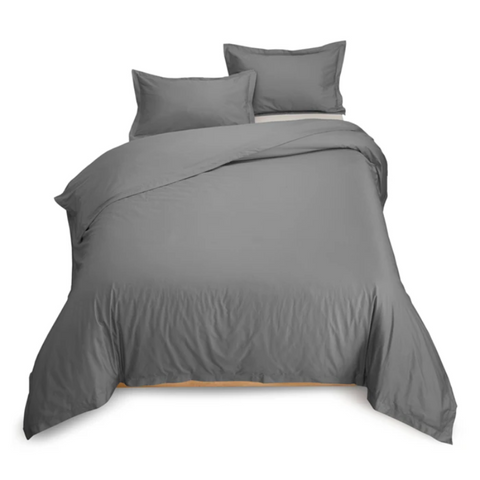Are you planning to make a new bedding purchase and then come across a range of duvets and comforters, which makes you wonder what is the difference between the two? I know you must be having a million questions in your mind by now. Maybe they are just called different names in different parts of the world….??
So, does that really make them different or is there any other structural difference between a duvet and a comforter!! There has been numerous debates as what there differences are! Hold on.....answers coming up in a few scrolls!!
As you are scrolling through the wide variety of duvets and comforters, there might be more questions popping up in your mind….Are duvets and comforters the same thing? Why does a duvet have a duvet cover but there is nothing like a comforter cover??
Don’t worry, we got you! Here, you will find all your answers which will help you make the right choice for you.

Even though both duvets and comforters appear to be very similar visually in terms of their fluffiness, and thickness and also are known to enhance the look of your room, they do have some differences. Let’s get right into it!! No not the comfy blanket…..I meant the explanations!!
What Is The Difference Between Them?
When it comes to keeping you warm, there are two options of quilts that come to mind….a duvet and a comforter. Even though they both fulfill the same purpose of hoping to provide you with a comfortable and cozy sleep throughout the night. The main difference is that a duvet is designed to be used with a duvet cover whereas a comforter can be used as it. But hey….it doesn’t stop there; they both have their pros and cons. We've listed some of them below!!
According to the experts at Cosmopolitan: Duvet VS. Comforter Debate Might Be The Most Important of Our Time.
"The fluff that tops your bed is arguably more important than the mattress or sheets! This is why we've gotta dive into the duvet vs comforter debate."

What Is A Duvet?
Duvet reminds you of something fluffy…doesn’t it!!
Yes, it can be understood as a fluffy quilt because it is basically that, a duvet is a quilted fabric designed with two pieces of fabric that are stuffed with warm feather-like materials such as goose down or feathers or some type of synthetic fabric (you can also find hypoallergenic and natural materials as stuffing’s for your duvet).
The fabric used to sew this is usually white, and that is why you can find a variety of down covers that can help make your room aesthetically awesome! A Duvet is sometimes referred to as a comforter in many parts of the world such as in the US but should not be confused with the differences between them.
Duvets come in a range of warm fillings which makes it easier for you to choose them as per your needs. Whether you like being warm or cool while sleeping, or prefer a warm yet light down, or simple bulkier and feather options or why not go for easy-to-care synthetic fabric materials.
You can find plenty of options when deciding the best duvet to fit your needs. We want to help you make the right choices so that you can find the duvet you need for a comfortable night’s sleep. So, we have compiled a list of materials you can find your duvets.
Types of Duvets
Silk-filled Duvets
Just like a wool filling, silk also has the natural ability to be a hypoallergenic material. Another advantage of this fill is that it has a breathable ability and will cool in the summer since it tends to be a lot lighter. For all the hot sleepers out there!!…. This is the type of fill that allows for better heat regulation than down or polyester duvets.
For a hot sleeper like Michel Sastre, this was the key to his good night sleep:
"These duvets are superb, in every way: light, they keep you warm without making you sweat and SOFT."
Wool duvets
Wool duvet/ comforter makes for an ideal warm and cozy bedding material as it helps retain air better, best for those who experience night sweats or hot flashes. Wool being naturally hypoallergenic is an ideal material for those suffering from skin sensitivities/ irritations and allergies. Perfect for the cold winter months in Canada since it acts as a natural insulator!!
Ashlee on the otherhand, found comfort in Downunder Bedding's Australian Washable Wool Oversized Duvet Comforter.
This wool duvet is made from the finest and cleanest sheep wool. It has balanced thermal insulation properties that gives an all season comfort.
Goose Down Duvets
These duvets are famous for being super light and breathable. Since these are filled with large down plumes from fully grown geese, they help ensure the duvet maintains its loftiness for longer.
Imagine using a Goose Down Duvet for over 25 years. Well according to Rodney:
"I bought my original comforter from Down Under 25 years ago. Back then they had a store in Toronto. I saved for months to buy it & it served me well for all these years.
Recently down started coming out of my well worn & loved comforter, so I decided to buy a new one. Found the Down Under website & wanted a couple of questions answered so I also called them."
Natural Duvets
Duvets and comforters are designed from natural materials such as bamboo or wool to help provide a more breathable and comfortable experience. Bamboo duvets are silky soft and are designed to meet your eco-friendly lifestyle while providing excellent comfort for many years.
Another alternative for hot sleepers is this Natural Wool Duvet from Down Under Bedding. Natural duvets has temperature-regulating properties and cooling effect that is perfect for those hot summer nights while having perfect insulation to keep you warm in winters.
Washable Microfiber Gel Duvet
The material is conditioned with antimicrobial and hypoallergenic protection as the material spins. With its double stitching, White piping and 100% Cotton shell, this duvet is elegantly soft and will last for years to come. This duvet helps provide comfort throughout the season and is Machine Washable, which makes them easy to care for.
Check out our Product Collections to see which best suites you. After all, we believe everyone sleeps differently.
What Is A Duvet Cover?
Duvet covers can simply be understood as a cover to protect your duvet. A duvet cover is simply an outer layer for your duvet/ comforter just as pillowcases are to your pillows. Since duvets and comforters are bulky and expensive, it can be hard to clean them on a regular basis.
The duvet covers help give an added layer of protection to keep your comforter from getting dirty. These covers not only protect your quilt but also can help give your room a fresher new look, as they are easy to change and replace than the whole quilt/ duvet itself.
A well-fitted duvet cover is very important as it might determine if you are able to get a good sleep. This is when you may also want to look at purchasing a duvet cover with insert ties.
Pros and Cons Of A Duvet?
Pros: Duvets are easy to care for since they are literally a bag of fluffed materials that are shoved in a duvet cover. You can always take the cover off and simply wash it! I know what’s coming to your mind…..Yes! you can always buy a new colorful cover for it and enhance the look of your room. Isn’t that just great!! I’m already excited!!
Another advantage of this is that depending on the fill, you can always opt for a cheap version of a duvet, such as a synthetic fiber-filled polyester duvet.
Cons: The bulky big duvets are sometimes hard to wash, and you may need another person for that. Don’t tell me I didn’t warn ya!! Keep in mind that many times you may find that your duvet is not staying in place inside the cover. This is when I advise you to consider a duvet with insert ties

What Is A Comforter?
A comforter is a thick, fluffy blanket that is sewn with insulating materials inside. A comforter is intended to sit on top of your bedding material and comes in a variety of options to suit your need…be it plain, colorful, or with familiar motifs. The best thing is you can wash them as is (always check manufacturers instructions) as you do not need a cover to protect them.
Comforters may not appear as fluffy and bulky as a duvet since they tend to have less filling inside them. Since they do not have many fillings in them you may need an additional layer of warmth. Keep in mind if you sweat a lot then you may want to add a thin bed sheet for added protection between you and the comforter so that you do not have to wash the whole thing that often. Most often they are machine washable, but the best would be to check the manufacturer’s instructions. Another tip to keep it hygienic for longer would be to use a duvet cover on top of your comforter.
Pros and Cons Of A Comforter?
Pros: Since comforters come with a built-in cover you do not need to remove the cover from a bulky bedding addition as you can simply toss the whole thing inside the washer!! They come in a variety of filling materials to suit your needs, be it cotton, polyester, wool blend, or natural silk.
You don’t need to stuff this huge blanket inside a sheet, which means no more worries searching for insert ties to hold your bulky quilt in place. Now that is a big plus for comforters. Another super cute reason to love comforters is that they come in sets with matching pillow covers!!! Yay…..best way to color coordinate your room.
A little secret: comforters are perfect for all of us lazy people who don’t want a separate covering for our quilt!!
Cons:Since they do not have many fillings in them, you may need an additional layer of warmth during winter months. Subsequently, with no added layer of protection for the comforter, you may need to clean the whole thing more often.
In case, you fall in love with another color or design for your quilt, you may need to replace the whole comforter.
Can A Duvet Cover Be Used On a Comforter?
Well….it's ultimately up to you to decide what works best for you. Many people prefer the simplicity that comforters bring (some people get too attached to a piece of fabric and some people may just be too lazy). Yet others like accessorizing their room, and duvets provide the best alternatives by providing the flexibility of changing their covers.
Best advice…..choose what works best for you in terms of your lifestyle and ease of use. This is the time you should be asking yourself some questions such as….. Do you eat food on your bed? Or do you have small kids that could drop something on your quilt?? If you answer yes to these questions then you may want to consider purchasing a duvet, as it’s easier to simply clean the cover rather than cleaning a whole bulky comforter. Or do you like the simplicity that a comforter provides??
Yet if you are still confused check out some points below which might help make your decision easier.

Which Should You Choose?
Price:You may find both duvet and comforter to be within your price range, depending on the material you may want to purchase. But if you plan on buying a duvet; you will need a duvet cover which would add a little extra cost to your purchase. Comforters not only save you the cost of an extra cover but also might come as an added option with your bedding set (bed sheets and pillowcases).
Thickness and warmth:Comforters are known to be thin quilted blankets with insulated filling, whereas duvets tend to be a lighter yet bulkier bedding addition. Due to being thinner, comforters also tend to be traditionally less warm than duvets. Duvets would be a more ideal option for people living in colder regions.
Style:If the style is one of the biggest factors when deciding on a quilt, then I would suggest you go for a duvet as you can easily change the look of your room by simply replacing it with a matching duvet cover. In the case of a comforter; if you get bored with that design you may need to replace the whole thing….this could be an expensive option if you suddenly develop a love for a new color or design.
Ease of use: Ahh…this is one of the most important options you may want to keep in mind while making this decision! Even though duvets seem to be easy to care option…as all you have to do is take off the duvet cover and toss it in the washing machine, the hassle is when you have to put the cover back on. And the most important thing to keep in mind is the shifting of your duvet inside your duvet cover. Yes…we do have another blog on this,How To Prevent Your Duvet from Moving Inside the Duvet Cover. Comforters, on the other hand, are easier to wash as you simply have to toss the whole thing in the laundry.Always check the label for washing instructions!
To sum it all up….a duvet comes with a duvet cover whereas a comforter comes as is. Checking out the pros and cons of both would help you prioritize your choice of bedding addition. And remember whatever you choose you can always switch a comforter to a duvet by adding a duvet cover that fits on, whereas in the case of a duvet you can simply change the style by replacing the duvet cover.










Leave a comment (all fields required)